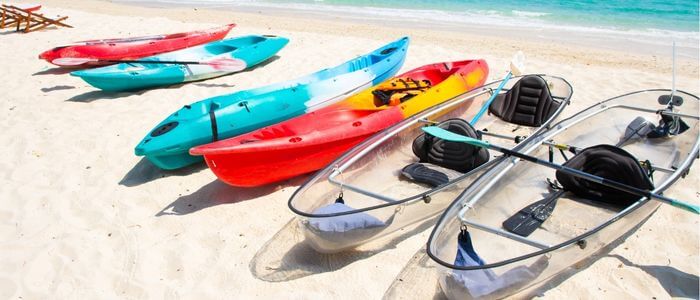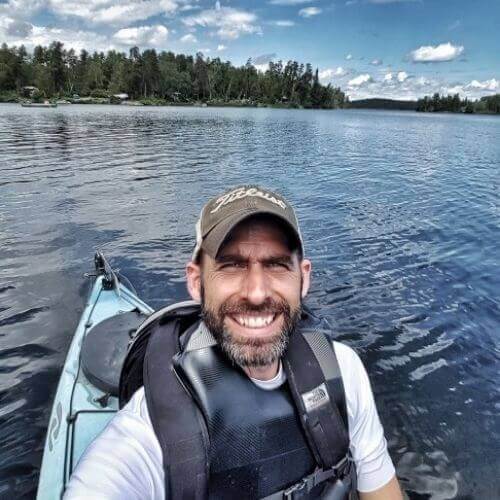
Kayaking can be a truly exhilarating experience: the thrill of an open-top canoe with the resounding crash of foamy whitewater is an adrenaline rush that we’ve all come to love. But do you know how to properly protect yourself against the elements?
Kayak safety, canoe awareness and knowing how to navigate the waters is absolutely essential when it comes to taking on the lakes; if you’re planning a great USA Kayak trip, you NEED to know the dangers you might face.
Good news: throughout this article, we’ll explore all of the potential kayak hazards to help you make the most of your whitewater experience!
Not knowing how to control your kayak is one of the biggest risks on the water – and it doesn’t just apply to you. You need to be hyper-aware of EVERYTHING around you, from rocks, debris and other obstacles, all the way to the other Kayakers.
Before you even think about heading onto the lake, it’s imperative that you understand how to use a kayak. Make sure that you have a solid understanding of the fundamental basics, so that you don’t pose a risk to yourself or others nearby.
Unfortunately, you can’t always guarantee that everyone around you has had proper training, either – so be sure to pay close attention to what they might be doing, and always keep a safe distance away.
If you’re new to the sport, looking for the best beginner Kayak to get started, you can read more just here.
Planning a kayak trip? Sounds great! But, have you packed the essentials?
The boat is strapped onto your kayak roof rack. You’ve packed your paddles, some snacks, maybe even a fishing rod or two – what about sun cream? A raincoat? How about a life-jacket?
We might sound like your mom right now, but your safety on the water is an utmost priority. One of the best ways to remain safe, protected and secure is to make sure that you pack everything that you might need. Here’s a little checklist:
Oh, and ALWAYS make sure you tell someone where you’re going.
If you don’t plan for your trip, you’re potentially exposing yourself to the elements. Without warm clothes to put on after you get out of the water, you could be risking frostbite. Similarly, if it’s unexpectedly sunny, you might end up with sunburn!
Even if you’re a strong swimmer, you can’t predict the currents. Life jackets aren’t too expensive, and could save your life in a pinch!
This one is the most obvious kayak hazard; obstacles in the water can result in collisions which, in turn, might lead to serious (preventable) injuries.
We know that you can’t always predict the water conditions. You might find yourself caught in sudden winds, drifting callously towards the bank – that’s why you always need to regularly check the forecasts and properly plan your route!
When you hit an obstacle, one of two things is likely to happen:
If you’re not confident in your kayak abilities, AVOID routes that contain protruding rocks, jutting trees or other damaging risks, such as:
You should only ever pick routes that you know are well-within your capabilities. Do your research!
One of the best ways to avoid obstacles is to learn how to control your speed. If you need to know how to speed up in a kayak, look no further.
This one might be a bit sinister, but it’s essential that we talk about it.
Drowning is one of the most common risks associated with kayaking, and is usually the result of brazen (and stupid) kayakers who are either overly confident in their abilities, or those who haven’t come properly prepared for the trip.
It really blows our minds when we learn about beginner kayakers who head out onto whitewater without the proper safety equipment, or those who float into the ocean on an ambitious solo trip. Perhaps most surprisingly, some people even try kayaking without being able to swim!
In order to prevent the risk of drowning, promote kayak safety and potentially save lives, there a few things that every kayaker must do:
It’s also important to understand that you should NEVER head out by yourself – even if you know the route well!
There’s a lot of activity involved when it comes to kayaking: loading and unloading the boat, packing everything into the car or truck, setting everything up… and that’s before you even touch the water!
Kayaking is hard work. It takes a lot of effort to paddle the boat, and a lot of people might overestimate their abilities. There isn’t much worse than making it halfway into your trip, realizing you’ve pulled a muscle and then having to struggle back to camp!
Whilst muscle injuries aren’t the worst thing that can happen on the lake, they certainly aren’t pleasant. It can also take a while for them to heal, meaning that you might have to wait before you can get back in the water!
You can avoid muscle injuries by:
Kayaking is a workout!
If you follow the steps outlined throughout this essential kayak guide, you’ll be sure to have an enjoyable, memorable and SAFE trip!
Knowing what to avoid when kayaking has the potential to really make or break your trip – so stay informed!
Now that you’re prepared for the kayak trip of a lifetime, why not check out some of the best whitewater spots in the world?

Hey there kayak lovers! I’m Jay Schwartz, the author here at Kayak Guidance! You know water sports – you know me! My life is all about it. Kayaking, Paddleboarding, Fishing, Snorkeling and so much more. I love to share my passion and knowledge with all of you.

Hey there kayak lovers! I’m Jay Schwartz, the author here at Kayak Guidance! You know water sports – you know me! My life is all about it. Kayaking, Paddleboarding, Fishing, Snorkeling and so much more. I love to share my passion and knowledge with all of you.

Welcome to KayakGuidance.com! If you’re looking to have some fun outdoor water adventures, then you have come to the right place. We help our readers find the best kayaks and water related equipment to help you have the best time of your life whenever you are engaging in water activities.
This site is a participant in the Amazon services LLC associates program, an affiliate advertising program designed to provide a means for sites to earn advertising fees by advertising and linking to Amazon.com.